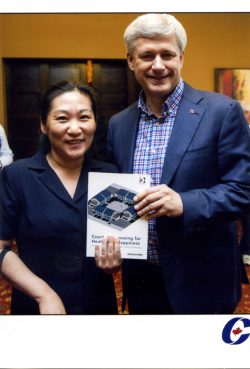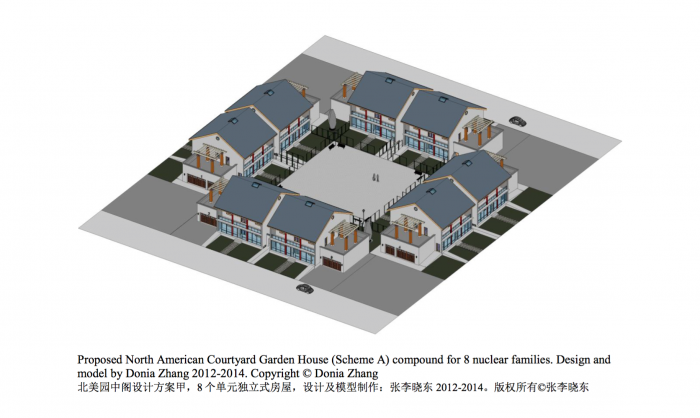I graduated from Oxford Brookes University in the UK in April 2012, with a PhD in Architectural Humanities and Social Sciences. My subject is interdisciplinary combining the study of housing forms with human behaviors in six courtyard housing projects in Beijing and Suzhou of China. My thesis is published as a book by Ashgate/Routledge in 2013 and 2016.
I have not been able to find a paid postdoc position because my topic is very specialized. I have found that no academic institution in Canada or the US has expertise to support my research on the topic. Therefore, in 2012, I asked my PhD External Examiner, SUNY Distinguished Professor Emeritus, Ronald G. Knapp, to advise on a self-funded research project on “Chinese Housing in North America.” Towards the end of the project, I was luckily introduced to Richard Harris, a housing expert in Canada from McMaster University, who invited me as a Visiting Scholar for three months in 2014, and who offered his reviews and wrote the book forward for my postdoctoral work published by Ashgate/Routledge in 2015 and 2016.
Although I have not been offered a tenure-tracked position, I have been accepted for volunteer positions as a Research Associate at York Centre for Asian Research (2013-2014) and the City Institute at York University (2013-2015). These positions have afforded me the opportunities to attend various lectures and seminars at York University, the University of Toronto, and the University of Ottawa. In addition, my PhD Supervisor, Marcel Vellinga, at Oxford Brookes University, has recently been commissioned to be the Editor-in-Chief of a second, revised edition of the award winning Encyclopaedia of Vernacular Architecture of the World. The first edition, edited by Paul Oliver, and published in 1997, was awarded the prestigious Sir Banister Fletcher Award for Art and Architecture. I have been invited as a Contributor to the second edition, which is scheduled to be published in 2018.
I feel fortunate that these opportunities have helped expand my publication records. However, I still would like to get paid for the work I do to make a living, as currently, I am still living with my mom for financial support. My parents and I have lived together since they immigrated to Canada in 1997. I came here in 1995. We set up a family business — a Chinese Medical Clinic in our single-detached house basement from 1997-2014. When my father’s health condition became critical in 2014, we sold the house and bought two apartments. One is a retirement home where we live now, and another one I rent out to gather income to support our living expenses and maintenance fees here. My father passed away last May, so now I live with my mom in this retirement home, partly also supported by her pension. It is not a lot of money, but we manage. Reflecting on the outcomes of the TRaCE project, I suggest that the Canadian government should provide each PhD in Humanities graduate a kind of benefit if they are not employed, something like $800-1000 dollars a month, similar to EI, or the benefits given to veterans and retirees, because we contribute so much of our lives towards improving Humanity’s welfare through our research and our time and energy in practice-based work.
After getting my PhD in 2012, I found it more difficult getting a teaching job in Canada, compared with my own experience of getting three Ontario colleges’ teaching jobs within one year in 2006. So, I registered a corporation in Ontario, called “Neoland School of Chinese Culture Ltd.” as a ‘home’ for my academic research projects and writings. Due to a lack of funding and resources the school has been largely inactive, though I have developed a curriculum and created four course outlines.
Since living in the retirement home, there have been frequent visitors who are MPs, MPPs, Mayor, and local Councilors. I even met our former Prime Minister Stephen Harper, who came to our community for his election campaign in October 2015. I presented a copy of my new book to him; he was very pleased and asked his assistant to take a photo with me together with my book. I also receive regular invitations from our local MP, Leona Alleslev, who asks me to attend their various public meetings, and I always contribute ideas in writings.

Image: Donia Zhang and Former Prime Minister Stephen Harper, Mon Sheong Court Richmond Hill, Ontario, Canada. October 11, 2015
I have tried to commercialize my research findings by contacting real estate developers in Canada and the US to get my designs of courtyard garden houses built (see image below). The most positive response so far is from Habitat for Humanity, a charity organization with offices all over the world; the Greater Toronto Area Regional Vice President, Thomas Fischer, is going to meet me at the end of May for a possible collaboration on a cohousing/supportive housing project in the Greater Toronto Area. I am looking forward to this meeting and have been preparing for it. Also, I have six more journal papers to write before the end of 2016; they are mostly extracted from my past four graduate theses and one dissertation.

Author’s website: https://doniazhang.wordpress.com/
I graduated from Oxford Brookes University in the UK in April 2012, with a PhD in Architectural Humanities and Social Sciences. My subject is interdisciplinary combining the study of housing forms with human behaviors in six courtyard housing projects in Beijing and Suzhou of China. My thesis is published as a book by Ashgate/Routledge in 2013 and 2016.
I have not been able to find a paid postdoc position because my topic is very specialized. I have found that no academic institution in Canada or the US has expertise to support my research on the topic. Therefore, in 2012, I asked my PhD External Examiner, SUNY Distinguished Professor Emeritus, Ronald G. Knapp, to advise on a self-funded research project on “Chinese Housing in North America.” Towards the end of the project, I was luckily introduced to Richard Harris, a housing expert in Canada from McMaster University, who invited me as a Visiting Scholar for three months in 2014, and who offered his reviews and wrote the book forward for my postdoctoral work published by Ashgate/Routledge in 2015 and 2016.
Although I have not been offered a tenure-tracked position, I have been accepted for volunteer positions as a Research Associate at York Centre for Asian Research (2013-2014) and the City Institute at York University (2013-2015). These positions have afforded me the opportunities to attend various lectures and seminars at York University, the University of Toronto, and the University of Ottawa. In addition, my PhD Supervisor, Marcel Vellinga, at Oxford Brookes University, has recently been commissioned to be the Editor-in-Chief of a second, revised edition of the award winning Encyclopaedia of Vernacular Architecture of the World. The first edition, edited by Paul Oliver, and published in 1997, was awarded the prestigious Sir Banister Fletcher Award for Art and Architecture. I have been invited as a Contributor to the second edition, which is scheduled to be published in 2018.
I feel fortunate that these opportunities have helped expand my publication records. However, I still would like to get paid for the work I do to make a living, as currently, I am still living with my mom for financial support. My parents and I have lived together since they immigrated to Canada in 1997. I came here in 1995. We set up a family business — a Chinese Medical Clinic in our single-detached house basement from 1997-2014. When my father’s health condition became critical in 2014, we sold the house and bought two apartments. One is a retirement home where we live now, and another one I rent out to gather income to support our living expenses and maintenance fees here. My father passed away last May, so now I live with my mom in this retirement home, partly also supported by her pension. It is not a lot of money, but we manage. Reflecting on the outcomes of the TRaCE project, I suggest that the Canadian government should provide each PhD in Humanities graduate a kind of benefit if they are not employed, something like $800-1000 dollars a month, similar to EI, or the benefits given to veterans and retirees, because we contribute so much of our lives towards improving Humanity’s welfare through our research and our time and energy in practice-based work.
After getting my PhD in 2012, I found it more difficult getting a teaching job in Canada, compared with my own experience of getting three Ontario colleges’ teaching jobs within one year in 2006. So, I registered a corporation in Ontario, called “Neoland School of Chinese Culture Ltd.” as a ‘home’ for my academic research projects and writings. Due to a lack of funding and resources the school has been largely inactive, though I have developed a curriculum and created four course outlines.
Since living in the retirement home, there have been frequent visitors who are MPs, MPPs, Mayor, and local Councilors. I even met our former Prime Minister Stephen Harper, who came to our community for his election campaign in October 2015. I presented a copy of my new book to him; he was very pleased and asked his assistant to take a photo with me together with my book. I also receive regular invitations from our local MP, Leona Alleslev, who asks me to attend their various public meetings, and I always contribute ideas in writings.

Image: Donia Zhang and Former Prime Minister Stephen Harper, Mon Sheong Court Richmond Hill, Ontario, Canada. October 11, 2015
I have tried to commercialize my research findings by contacting real estate developers in Canada and the US to get my designs of courtyard garden houses built (see image below). The most positive response so far is from Habitat for Humanity, a charity organization with offices all over the world; the Greater Toronto Area Regional Vice President, Thomas Fischer, is going to meet me at the end of May for a possible collaboration on a cohousing/supportive housing project in the Greater Toronto Area. I am looking forward to this meeting and have been preparing for it. Also, I have six more journal papers to write before the end of 2016; they are mostly extracted from my past four graduate theses and one dissertation.

Author’s website: https://doniazhang.wordpress.com/
Discussion